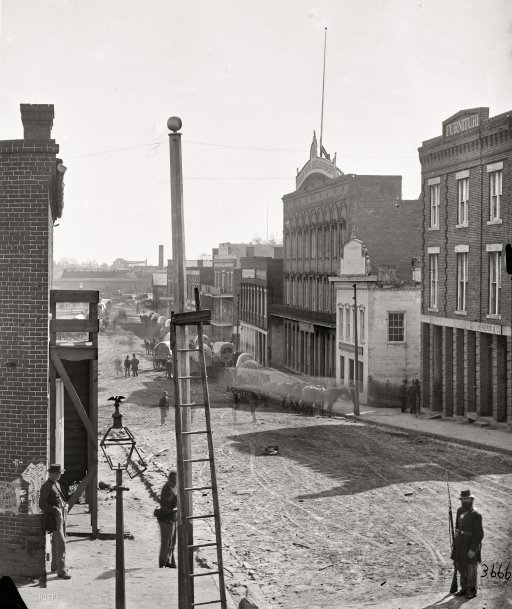
George N. Barnard Atlanta, Georgia. View on Marietta Street 1864

It’s only been 5 months, after all….: “Whitehall is working on 500 Brexit-related projects and could need 30,000 extra staff..”
• UK Government Has No Plan For Brexit, Leaked Memo Says (BBC)
The government has no overall Brexit plan and a negotiating strategy may not be agreed by the cabinet for six months, a leaked memo has suggested. The memo – obtained by The Times and seen by the BBC – warns Whitehall is working on 500 Brexit-related projects and could need 30,000 extra staff. However, there is still no common exit strategy “because of divisions within the cabinet”, the leaked document adds. A government spokesman said it “didn’t recognise” the claims made in the memo. Prime Minister Theresa May hopes to invoke Article 50 – beginning the formal two-year process for leaving the EU – by the end of March next year. However, BBC political correspondent Chris Mason – who has seen the memo – says the document shows how “complex, fraught and challenging delivering Brexit will be”.
The leaked Cabinet Office memo – written by an un-named consultant and entitled “Brexit Update” of 7 November – suggests it will take another six months before the government decides precisely what it wants to achieve from Brexit or agrees on its priorities. The report criticises Mrs May, who it says is “acquiring a reputation of drawing in decisions and details to settle matters herself” – an approach it describes as being “unlikely to be sustainable”. The Times says the document also identifies cabinet splits between Foreign Secretary Boris Johnson, Brexit Secretary David Davis and International Trade Secretary Liam Fox on one side, and Chancellor Philip Hammond and Business Secretary Greg Clark on the other.
According to the newspaper, the memo said: “Every department has developed a ‘bottom-up’ plan of what the impact of Brexit could be – and its plan to cope with the ‘worst case’. “Although necessary, this falls considerably short of having a ‘government plan for Brexit’ because it has no prioritisation and no link to the overall negotiation strategy.” The memo also suggests the government does not have enough officials to implement Brexit quickly, while departments are developing individual plans resulting in “well over 500 projects”. It estimates an additional 30,000 extra civil servants could be required to meet the workload. The document also says big businesses could soon “point a gun at the government’s head” to secure what they need to maintain jobs and investment.

Tax evasion.
• Why India Wiped Out 86% Of Its Cash Overnight (BBC)
India is in the middle of an extraordinary economic experiment. On 8 November, Prime Minister Narendra Modi gave only four hours’ notice that virtually all the cash in the world’s seventh-largest economy would be effectively worthless. The Indian government likes to use the technical term “demonetisation” to describe the move, which makes it sound rather dull. It isn’t. This is the economic equivalent of “shock and awe”. Do not believe reports that this is primarily about bribery or terror financing, the real target is tax evasion and the policy is very daring indeed. Mr Modi’s “shock and awe” declaration meant that 1,000 and 500 rupee notes would no longer be valid. These may be the largest denomination Indian notes but they are not high value by international standards – 1,000 rupees is only £12. But together the two notes represent 86% of the currency in circulation.
Think of that, at a stroke 86% of the cash in India now cannot be used. What is more, India is overwhelmingly a cash economy, with 90% of all transactions taking place that way. And that is the target of Mr Modi’s dramatic move. Because so much business is done in cash, very few people pay tax on the money they earn. According to figures published by the government earlier this year, in 2013 only 1% of the population paid any income tax at all. As a result huge numbers of Indians have stashes of tax-free cash hidden away – known here as “black money”. Even the very poorest Indians have some cash savings – maybe just a few thousand rupees stored away for a daughter’s wedding, the kids’ school fees or – heaven forbid – an illness in the family.
But lots of Indians have much more than that. It is not unusual for half the value of a property transaction to be paid in cash, with buyers turning up with suitcases full of 1,000 rupee notes. The size of this shadow economy is reckoned to be as much as 20% of India’s entire GDP. Mr Modi’s demonetisation is designed to drive black money out of the shadows. At the moment you can exchange up to 4,000 (£48) of the old rupees every day in cash for new 500 (£6) and 2,000 (£24) rupee notes. There is no limit to the amount that can be deposited in bank accounts until the end of December, but the government has warned that the tax authorities will be investigating any deposits above 250,000 rupees (£2,962).

This may continue for a while. Energy in the crosshairs.
• Asian Currencies Drop to 7-Year Low Against US Dollar (BBG)
A gauge of emerging Asian currencies is heading for the lowest close since March 2009 as the dollar surged after Donald Trump’s unexpected election victory. The Bloomberg-JPMorgan Asia Dollar Index, which tracks 10 regional currencies, is down 2% this year. As recently as August it was up 1.7%. Emerging assets have tumbled in the past week as the president-elect is seen unleashing a spending surge, pushing the Federal Reserve to raise interest rates.
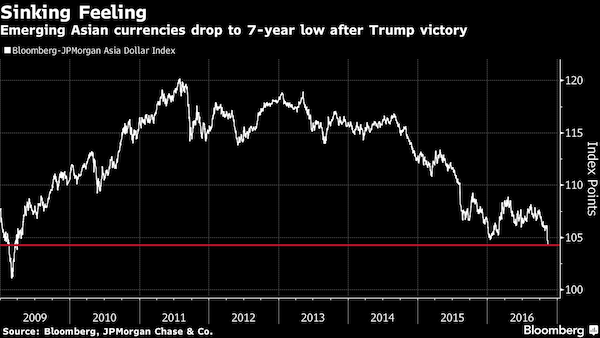

The euro is way overvalued anyway, of course. Parity would sake the south to its core, though, much more than the north.
• The Euro-Dollar Parity Bet Is Back (BBG)
Donald Trump’s electoral upset has breathed new life into the bet that diverging economic paths will drive the euro toward parity with the dollar for the first time since 2002. Traders see about a 45% chance the European currency will sink to $1 in the next year, about double the probability assigned a week ago. The president-elect’s pledges to boost spending and cut taxes are fueling speculation that economic growth will accelerate, pushing the Federal Reserve to raise interest rates more quickly. That sentiment sent a gauge of the dollar to the strongest since February on Monday, while the euro fell to about $1.07, touching its lowest since 2015.
For Deutsche Bank, the world’s fourth-biggest currency trader, the election results are enough to jolt the euro out of a range it’s been stuck in for months and push it below $1 in 2017. Calls for parity crumbled this year as the Fed cut back on the number of expected rate hikes, even as the ECB continued to add unprecedented amounts of stimulus. Now Trump’s win is rekindling the wager that drove the dollar to back-to-back annual gains in 2014-2015, for its biggest two-year rally since the euro’s 1999 debut. “Divergence is back,” George Saravelos, a strategist at Deutsche Bank in London, wrote in a report dated Nov. 13. “The Trump victory has changed things.”
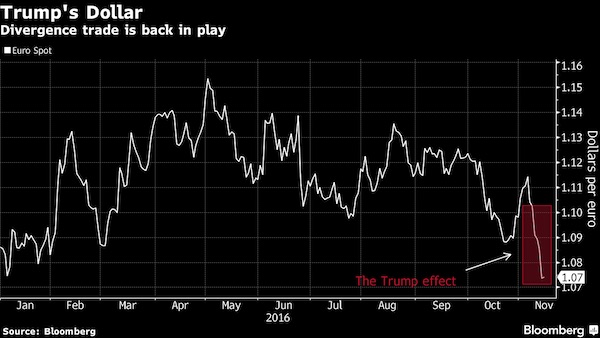

The Trump fairytale lacks all sense of reality. He’s going to stumble upon a zillion roadblocks on his way to get the best of what he can get, and that means volatility.
• ‘Trump Thump’ Whacks Bond Market For $1 Trillion Loss (R.)
Donald Trump’s stunning victory for the White House may mark the long-awaited end to the more than 30-year-old bull run in bonds, as bets on faster U.S. growth and inflation lead investors to favor stocks over bonds. A two-day thumping wiped out more than $1 trillion across global bond markets worldwide, the worst rout in nearly 1-1/2 years, on bets that plans under a Trump administration would boost business investments and spending while firing up inflation. “We’ve had a sentiment shift in the bond market. We’ve seen it, too. People have already started reallocating out of bonds and into stocks,” said Jeff Gundlach, CEO of DoubleLine Capital. “The cracks have been forming for five years – we’re in this slow-grinding higher phase in yields,” he said.
The stampede from bonds propelled longer-dated U.S. yields to their highest levels since January with the 30-year yield posting its biggest weekly increase since January 2009. In the stock market, the blue chip Dow Jones industrial average finished out its best week in five years on Friday as it marked a record high close. The 10-year German Bund yield rose to its highest level in eight months, while the 10-year British gilt yield climbed to its highest level prior to Brexit. [..] While investors dumped most types of bonds after Trump’s victory, they piled into Treasury inflation-protected securities as a hedge against a pick-up in inflation. “You are seeing interest in TIPS right now from a widening investors base,” said Brian Smith, portfolio manager at TCW in Los Angeles, which has $197 billion in assets. Investors poured $1 billion into TIPS in the week ended Nov. 9, the second-biggest inflows since records began in October 2002.

Trump may hand China exactly what it needs but is afraid to face.
• China: Trump’s First Crisis? (JP Smith)
There is a growing possibility that China will be at the epicentre of President-elect Trump’s first crisis, triggered by concerns over the potential impact of protectionist measures on China’s trade surplus, which currently supports the increasingly fragile financing chains supporting corporate debt that the IMF estimates at around 155% of GDP. Trump’s pledges to impose tariffs of up to 45% on Chinese manufactured goods threatens to drive a significant uptick in the amount of capital flight from the renminbi, while the prospect of measures to change the US tax system to encourage companies to repatriate cash to the are already pulling the dollar higher.
At this point the likelihood of Trump actually delivering on his protectionist rhetoric is secondary to the psychological impact on resident corporate and household savers of any potential threat to the current uneasy equilibrium within the Chinese economy. The situation could quickly become much more acute than the one faced by the FOMC earlier this year, when the Fed appears to have backed off raising rates primarily due to concerns about China, so that President Trump will have to make a decision whether to clarify his intentions towards China and possibly repudiate his key campaign pledge at a relatively early stage of his presidency.
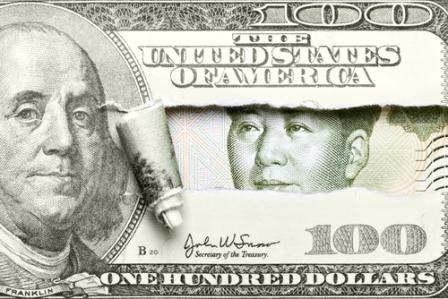
The consequences of his not doing so could be to precipitate an economic and financial crisis within China, that would obviously have major adverse consequences for the regional and global economies and also some potentially very serious implications for geopolitical stability. In brief, our longstanding bearish view on China has rested on the governance factors at both a central and local government level that have led to massive cost factor subsidies driving overcapacity across a broad range of industries. This has resulted in very high levels of debt which are being financed from an increasing range of institutions and instruments, most recently the city and county banks and shadow financing instruments, all of which are lack transparency even by Chinese standards.
No-one disputes any more that an increasing amount of financing is being used to service and roll over existing loans and that higher write-offs are not keeping pace with the flow of doubtful loans. The financing structures that surround the overcapacity industries are increasingly fragile especially on a regional level; Chinese enterprises are simply too interconnected to fail. Over the course of 2016, there have been some indications of a visible improvement in both the macro-economic and corporate numbers, as well as some of the more physical and therefore reliable indications of activity such as power production and freight journeys. This has, however, been a function of the massive monetary and fiscal stimulus beginning in the second half of 2015, to head off a potential crisis in response to the plunge in the onshore equity market.

“As if defusing the world’s biggest debt bomb while keeping economic growth humming wasn’t tough enough..”
• China’s Central Bank Faces Trump Headache (BBG)
As if defusing the world’s biggest debt bomb while keeping economic growth humming wasn’t tough enough, Donald Trump’s shock election victory has just made the policy outlook even more complex for People’s Bank of China Governor Zhou Xiaochuan. The president-elect’s threats to slap tariffs of up to 45% on Chinese imports cast a shadow over the economy’s stabilization and the world’s most crucial trade relationship. Protectionism may fuel more international use of the yuan, according to Standard Chartered, while UBS says tariffs may push the PBOC to let the yuan fall further. Longer-term ambitions like capital account opening and yuan internationalization are also clouded, hinging on whether President Trump delivers on candidate Trump’s promises.
The PBOC’s monetary policy becomes trickier, and harder to keep neutral, amid “huge uncertainty” about Trump’s impact on China, according to Larry Hu at Macquarie in Hong Kong. “It’s hard to tell what would be actual policies instead of just campaign rhetoric,” Hu wrote in a note. Even before Trump takes office Jan. 20, there’s reason to think his campaign threats to impose tariffs and label China a currency manipulator may be tempered by the reality of governing. He’s already signaled there may be some watering down of other contentious issues such as building a wall on the Mexican border and scrapping President Barack Obama’s health care program. There’s a low probability that the PBOC will cut its benchmark interest rates or the required reserve ratio for banks this year, the state-run Xinhua News Agency reported Tuesday. The central bank has held its main rates at record lows for more than a year to support growth.
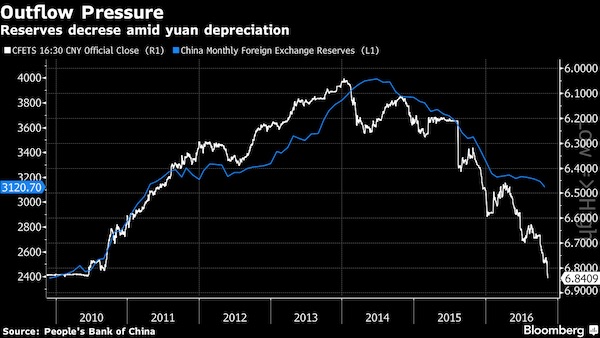

Whatever happened to people’s right to shelter?
• The World’s Biggest Real Estate Binge Is Coming To A City Near You (BBG)
If they were anywhere else in Beijing, the five young women in cowboy hats and matching red, white, and blue costumes would look wildly out of place. But here at the city’s biggest international property fair – a frenetic gathering of brokers, developers and other real estate professionals all jockeying for the attention of Chinese buyers – the quintet of wannabe Texans fits right in. As they promote Houston townhouses (“Yours for as little as $350,000!”), a Portugal contingent touts its Golden Visa program and the Australian delegation lures passersby with stuffed kangaroos. Welcome to ground zero for the world’s largest cross-border residential property boom. Motivated by a weakening yuan, surging domestic housing costs and the desire to secure offshore footholds, Chinese citizens are snapping up overseas homes at an accelerating pace.
They’re also venturing further afield than ever before, spreading beyond the likes of Sydney and Vancouver to lower-priced markets including Houston, Thailand’s Pattaya Beach and Malaysia’s Johor Bahru. The buying spree has defied Chinese government efforts to restrict capital outflows and shows little sign of slowing after an estimated $15 billion of overseas real estate purchases in the first half. For cities in the cross-hairs, the challenge is to balance the economic benefits of Chinese demand against the risk that rising home prices spur a public backlash. “The Chinese have managed to accumulate very large amounts of wealth, and the opportunities to deploy that capital in their own market are somewhat restricted,” said Richard Barkham at CBRE, the world’s largest commercial property brokerage. “China has more than a billion people. Personally, I think we have just seen a trickle.”
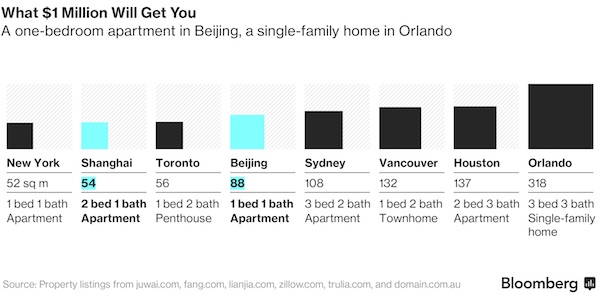

I have too much to say on this to say it here.
• America Has Abdicated Its Leadership of the West (Spiegel)
Even history sometimes leans toward pathos. In January 2017, when Donald Trump is sworn in as the 45th president of the United States, the American Age will celebrate its 100th birthday – and its funeral. The West was constituted in its modern form in January 1917. World War I was raging in Europe at the time and in Washington, D.C., President Woodrow Wilson told his country that it was time for Americans to take responsibility for “peace and justice.” In April he said: “The world must be made safe for democracy.” He declared war on Germany and sent soldiers to Europe to secure victory for the Western democracies – and the United States assumed the leadership of the Western world. It was an early phase of political globalization. One hundred years later: Trump.
Trump, who wants nothing to do with globalization; Trump, who preaches American nationalism, isolation, partial withdrawal from world trade and zero responsibility for a global problem like climate change. And all of this after a perverse election campaign marked by resentment, racism and incitement. Human dignity is the centerpiece of the Western project. Following the revolutions in France and the US in the late 18th century, states began guaranteeing human rights for the first time. Human rights have a normative character, as Heinrich August Winkler argued in his monumental work “History of the West.” And a racist cannot embody this normative project. Trump has no sense of dignity – neither for himself nor others. He does not qualify as the leader of the Western world, because he is both unwilling and incapable of assuming that role.
We now face emptiness – the fear of the void. What will happen to the West, to Europe, to Germany without the United States as its leading power? Germany is a child of the West, particularly of the United States, brought to life with American generosity, long spoon-fed and now in a deep state of shock. The American president was always simultaneously our president, at least a little, and Barack Obama was a worthy president of the West. Now, though, we must come to terms with a lack of Western leadership. What were those 100 years like? The history of the modern West can be told in many ways: as a heroic tale, as a story of greed, as a mission or as a tale of fear. This article is about 100 years of fear, in particular the fear for our freedom, a quintessentially American paranoia that spread to the rest of the West. The word is not being used negatively here; we are talking about fear as a bulwark protecting us against danger. There are good fears and bad fears.

“If the answer to these questions is “yes,” then I am afraid we should prepare for economic collapse in very short order.”
• Memo to Trump: Defense Spending Must Be For Actual Defense (Ron Paul)
[..] The military budget is something very different from the defense budget. The military budget is the money spent each year not to defend the United States, but to enrich the military-industrial complex, benefit special interests, regime-change countries overseas, maintain a global US military empire, and provide defense to favored allies. The military budget for the United States is larger than the combined military spending budget of the next seven or so countries down the line. To get the military budget in line with our real defense needs would require a focus on our actual interests and a dramatic decrease in spending. The spending follows the policy, and the policy right now reflects the neocon and media propaganda that we must run the rest of the world or there will be total chaos. This is sometimes called “American exceptionalism,” but it is far from a “pro-American” approach.
Do we really need to continue spending hundreds of billions of dollars manipulating elections overseas? Destabilizing governments that do not do as Washington tells them? Rewarding those who follow Washington’s orders with massive aid and weapons sales? Do we need to continue the endless war in Afghanistan even as we discover that Saudi Arabia had far more to do with 9/11 than the Taliban we have been fighting for a decade and a half? Do we really need 800 US military bases in more than 70 countries overseas? Do we need to continue to serve as the military protection force for our wealthy NATO partners even though they are more than capable of defending themselves? Do we need our CIA to continue to provoke revolutions like in Ukraine or armed insurgencies like in Syria?
If the answer to these questions is “yes,” then I am afraid we should prepare for economic collapse in very short order. Then, with our economy in ruins, we will face the wrath of those countries overseas which have been in the crosshairs of our interventionist foreign policy. If the answer is no, then we must work to convince our countrymen to reject the idea of Empire and embrace the United States as a constitutional republic that no longer goes abroad seeking monsters to slay. The choice is ours.

“Their corrupt Democratic Party had a good if not great candidate in Bernie Sanders and their DNC deliberately fought to keep him from winning the primaries..”
• The Democratic Party Had a Good if Not Great Candidate in Bernie Sanders (CP)
It’s hard to empathize with the corporate liberals who streamed from the Javits Center in tears [last] Tuesday night. Their corrupt Democratic Party had a good if not great candidate in Bernie Sanders and their DNC deliberately fought to keep him from winning the primaries. In every poll taken during his campaign, Sanders beat Donald Trump in a hypothetical general election. Oh, they’ll start pouring out their bile now, blaming everyone but themselves and their candidate. It was the media’s fault for popularizing Trump (a Clinton strategy). It was the FBI’s fault for re-opening the email case (thanks to Huma Abedin’s ex). It was stupid Middle America’s fault for being racist and sexist (was that why they voted for Trump?). It was third-party supporters who screwed us in Florida again (Paul Krugman and Rachel Maddow are furious that leftists didn’t vote for their heroine). It was Russia’s fault for hacking the DNC (no evidence) and plotting to invade Europe (no evidence).
In Hillary’s farewell speech, she kept to form and quoted scripture–the very last guide she has used to shape her political life. In other words, she remained a hypocrite. She talked to little girls who think she is a great flagbearer for womankind, even though she precipitated the brutal destruction of infrastructure, the breakdown of law and order, and the eventual collapse of the Libyan state, throwing thousands of brown women, boys and girls into extreme danger and exile. She exported the same plan to Syria. And she supported a coup d’état in Honduras that has now led to predictably vicious repression and regular homicide. The truth is, Hillary was a terrible candidate. Like Al Gore. She was charmless and toneless. In an election atmosphere typified by personality politics, Hillary lacked one.
She had a rich track record of foreign policy meltdowns at the State Department and a feckless tenure in the Senate. She alienated Congress in 1993 when she failed to get health care reform passed. And she evidently used high office to peddle access and influence to Clinton Foundation donors. Her positions had changed repeatedly, suggesting she couldn’t be trusted. This, compounded by the scandal surrounding her lazy use of email in the trafficking of confidential information, and ham-fisted attempts to cover it up, cast her in the dimmest of lights with many Americans. An albatross husband still despised by conservatives and who loomed hungrily behind the floodlights of her campaign–didn’t help either.

Russia’s energy and banking sectors remain murky fields.
• Russian Economy Minister Detained Over Alleged $2 Million Bribe (R.)
Russian Economy Minister Alexei Ulyukayev has been detained over a $2-million bribe allegedly received for a “positive” assessment, which led to oil producer Rosneft acquiring a 50% stake in Bashneft, the country’s Investigative Committee said on Tuesday. He is the highest-ranked statesman in Russia arrested since the failed coup in 1991. The Investigative Committee, which directly reports to President Vladimir Putin, said the investigation would put forward charges soon. “Ulyukayev was detained at night, immediately after interrogation,” an Investigative Committee official told Reuters. It was not immediately clear, what exactly Ulyukayev, who has overseen massive government privatization, has been accused of, but Russian news outlet RT reported that the minister had been detained in the act of taking the bribe.
Kremlin spokesman Dmitry Peskov told TASS news agency that “this is a serious accusation”. “In any case, only a court is able to decide anything,” he was quoted as saying. RT reported that Peskov said he did not know if Putin was aware of the minister’s detention. According to RT, if found guilty, Ulyukayev could face a fine up to 100 times the size of the bribe plus the loss of the right to serve in some state positions and undertake certain activities for up to 15 years. A prison sentence of as long as 15 years and a fine that was 70 times the size of the bribe were other potential outcomes following a guilty verdict, RT said.

I’ve said it 1000 times: Turkey will never be a member of the EU. Countries will leave as soon as that propect gets real.
• EU Threatens Turkey With Economic Sanctions (TT)
Turkey-EU relations braced for a major showdown after the Turkish government renewed its push for bringing the death penalty back, leading to mutual recriminations, trading barbs over recent days. To reveal the gravity of the situation and its meaning for the EU, European Parliament (EP) President Martin Schulz even spoke about possible economic sanctions against Turkey over draconian emergency practices that destroyed central pillars of democracy and the rule of law. As Turkey’s record on human rights hits lows, its ramifications for the EU accession process becomes evidently palpable with dying prospects for membership in the foreseeable future. The unrelenting political crackdown inside Turkey has left the EU with few options seen deterrent to force Ankara to change its policies at home.
Speaking to German’s Bild am Sonntag newspaper, Schulz said about the political climate in Brussels where EU leaders discuss imposing economic sanctions against Turkey in response to President Recep Tayyip Erdogan’s actions to curb the opposition. The consideration of such an option is preferred to terminating entire talks between Turkey and the EU, he argued. “We as the EU will have to consider which economic measures we can take,” Schulz said. One of the arguments he brought forward is that the breakdown in relations would leave the EU with no leverage and option that it could wield influence Turkey to help the opposition and those who are held in pre-trial detention
But his warnings and comment fell on deaf ears in Ankara, prompting a swift rebuke from Turkish Foreign Minister Mevlut Cavusoglu, who called on Schulz to do whatever possible to back up his threats. Speaking at a press conference in Ankara along with his Chinese counterpart, Cavusoglu called on Schulz to remove banners and booths of Kurdistan Workers’ Party (PKK), which Turkey and the EU consider as a terrorist group, from EP building in Brussels. His criticism refers to periodic protests of pro-PKK groups near EP headquarters in Brussels as European Kurds demonstrate there against the Turkish state, set up tents and booths filled with PKK flags and images of imprisoned PKK chief Abdullah Ocalan.

If Sweden had a case, they would have made it eons ago. What a disgrace as a country.
• Julian Assange Faces Second Day Of Questioning (ITV)
WikiLeaks founder Julian Assange will be questioned for a second day inside the Ecuadorian Embassy in London over a sex allegation. Swedish prosecutor Ingrid Isgren and Swedish police inspector Cecilia Redell will once again interview Assange through a representative of the Ecuadorian government. They said a DNA sample will be taken if he gives consent. It is believed Assange was “fully cooperative” during their initial meeting on Monday. The process could take three days, before Swedish authorities decide on their next move.
However Ms Isgren will not be giving interviews during her stay in London. A statement said: “As the investigation is ongoing, it is subject to confidentiality. “This confidentiality also applies according to Ecuadorian legislation for the investigative measures conducted at the embassy. “Therefore, the prosecutors cannot provide information concerning details of the investigation after the interview.”

Still waiting for the big one.
• Highly Contagious Strain Of Bird Flu Sweeps Through Europe (DW)
The German state of Schleswig-Holstein widened protection measures on Monday to protect against an outbreak of the H5N8 influenza virus among wild birds, which has spread to poultry. All farms – including smallholdings – will be required to tighten biosecurity, with the use of protective clothing and footwear, and the widespread disinfection of all farm buildings and vehicles used to transport poultry. Over the weekend, 30,000 chickens were culled as a precaution at a farm close to the northern city of Grumby, which saw an outbreak of the virus. The affected breeder farm is currently being disinfected and cleaned, Schleswig-Holstein’s environment ministry said on Monday.
Two smaller poultry farms in the same state and the neighboring Mecklenburg-Western Pomerania were also affected over the weekend, but neither states registered new H5N8 cases on Monday, local officials said. So far, five German states have seen bird flu outbreaks, including the southern state of Baden-Württemberg, which reported cases around Lake Constance, which is bordered by Switzerland and Austria. The state of Saxony also confirmed the H5N8 virus was detected in a dead heron at a lake near the city of Leipzig. On Monday, Denmark sought to contain its own outbreak among wild birds by ordering a farm to destroy hundreds of thousands of eggs imported from Germany, as a precaution. Some 300,000 eggs from the farm in Grumby were supplied to a hatchery in the Danish town of Baekke, near Kolding. They are all expected to be destroyed by Tuesday.

Still waiting for the big one here as well. Jitters all around.
• 100,000 Landslides and Hundreds of Tremors After New Zealand Quake (G._
Up to 100,000 landslides were caused by New Zealand’s 7.8 magnitude earthquake, officials said, as aftershocks continued to shake parts of both islands of New Zealand and emergency crews worked to help people in the main affected areas. A major relief effort continued on Tuesday, with thousands of people stranded by the quake, which blocked roads and damaged many buildings across parts of the North and South islands. Emergency services and defence personnel were evacuating hundreds of tourists and residents from Kaikoura, the heavily hit South Island town, amid more strong aftershocks on Tuesday.
The powerful earthquake killed two people. It struck just after midnight on Sunday, destroying farm homesteads, sending glass and masonry toppling from buildings in the capital, Wellington, on the North Island and cutting road and rail links throughout the north-east of the South Island. As aftershocks continued to rattle the region on Wednesday, emergency services cordoned off streets in Wellington and evacuated several buildings due to fears one of them might collapse. Gale-force winds and rain were hampering recovery efforts as wild weather brought floods to the Greater Wellington region. Hundreds of aftershocks continued to rock the region. A 5.4 tremor was among the bigger aftershocks and was felt strongly in Wellington.









Home › Forums › Debt Rattle November 15 2016